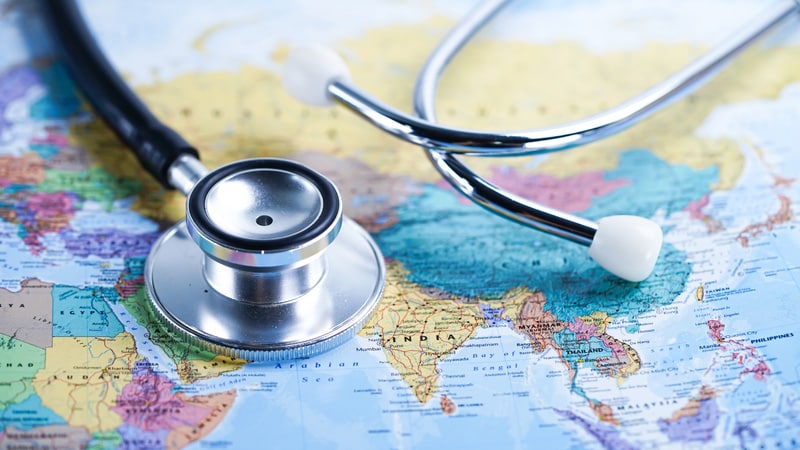Special Olympics and athletes’ health, first victims of Oropouche fever in Brazil, AIDS news, contaminated tattoo inks in the United States, literary prize of the Academy of Medicine… A selection of international health news covered by our local editorial teams.
JO AND HEALTH
What diet for top athletes?
Should top athletes be subjected to an exceptional diet? To dispel all the myths on this subject and re-establish the reality of the facts, Professor Xavier Bigard, medical director of the International Cycling Union (UCI), provides a very precise update on the issue.
Olympics: Importance of mental health
Who are these American Olympic athletes who became doctors?
All athletes must prepare to bounce back professionally after a career in elite sport, whether it is crowned by a medal or not. Here, four Olympic participants who became doctors after their careers in elite sport tell their stories for Medscape.com (also read on Medscape.fr).
Quiz: risk of infection linked to swimming in the Seine
With several Olympic events taking place in the Seine, what are the infectious risks to watch out for? What are the symptoms to look out for and the diagnostic tests to prescribe? Test your knowledge with this 5-question quiz.
Food supplements for athletes: be careful!
Anses warns athletes, coaches and health professionals that the consumption of food supplements and other enriched foods is not without health risks. It also warns of the risks associated with these products, particularly in the event of doping controls.
EPIDEMICS
West Nile fever: deaths in Spain
Two women die of Oropouche fever in Brazil
These are the first deaths observed linked to Oropouche fever, a disease originally transmitted by insects and mosquitoes. The victims, aged under 30, did not have any comorbidities (Read on Medscape.pt). Brazil is also affected by a surge in dengue fever cases with nearly 5,000 deaths since the beginning of 2024.
HEAT WAVE
Heatwave: activation of the “Heatwave Info Service” toll-free number
Faced with a heat wave that has spread rapidly across the country, the Directorate General of Health has decided to activate the Heatwave Info Service hotline on 0800 06 66 66 from Monday 29 July at 2 p.m. until the end of the heatwave (before the weekend).
Climate change: impact on mental health
Accelerating climate change increasingly threatens people’s mental health and psychosocial well-being, leading to psychological distress, depression, grief and suicidal behaviour. Two Swiss experts, a climatologist and a psychiatrist, take stock.
ALERT
Bacterial contamination of tattoo ink
Commercial tattoo and permanent makeup inks are too often contaminated with microbes that can cause infections, researchers warn in a groundbreaking study of the product. Testing 75 unopened, sealed tattoo and permanent makeup inks from 14 different manufacturers, U.S. researchers found that about 35 percent of the products were contaminated with bacteria (see Medscape.com et Medscape.fr).
AIDS CONGRESS
AIDS: so close and so far from the goal
The UNAIDS World AIDS Conference was held in Munich. This event is often the occasion for many announcements and messages, particularly regarding access to treatment (Read more on Jim.fr).
Towards tailor-made prevention
With the proliferation of HIV prevention solutions, it is becoming crucial to offer the solution best suited to the individual. This is the point explored in a symposium at the last AIDS conference.
RESEARCH
How microplastics affect digestive organs
Microplastics are ubiquitous and can be detected in many places in the human body. Experts from the German Society for Gastroenterology and Digestive and Metabolic Diseases (DGVS) have now presented New findings on the impact of microplastics on the digestive system.
Type 2 diabetes: do GLP-1 analogues protect against obesity-related cancers?
According to a large American study, treatment with GLP-1 analogues is associated with a reduction in the risk of developing ten obesity-related cancers, compared with insulin. Comments by Julien Bezin (Bordeaux University Hospital).
HOMEOPATHY IS LOSING GROUND
More homeopathy training in Baden-Württemberg
After two years of discussions, the German state of Baden-Württemberg will no longer offer continuing education in homeopathy for doctors, according to the state’s medical association.
Federal Health Minister Karl Lauterbach welcomed the decision, saying that doctors have nothing to learn about homeopathy. The German Central Association of Homeopathic Doctors (DZVhÄ), on the other hand, expressed its anger. The state medical association stressed that the measure would not limit or prohibit the treatment of patients (to read on Coliquio.de).
INTERVIEW
“Wow, you’re with Doctors Without Borders! An anesthesiologist explains what the “dream job” really is and how to get there (Read more on Medscape.de).
BOOK
“Story of the man who did not want to die”
In “Story of the Man Who Didn’t Want to Die”, Swiss author Catherine Lovey describes the relationship between two solitary beings who are complete opposites and who are brought together by illness. Through this intimate but never shameless story, this book, which won the literary prize of the Academy of Medicine, takes the reader back to their existential anxieties.


